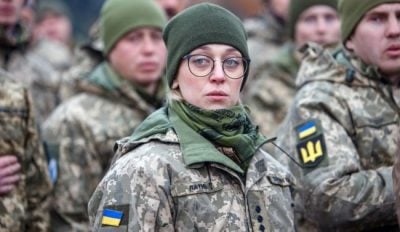Kiev to Recruit People with Health Problems

All Global Research articles can be read in 51 languages by activating the Translate Website button below the author’s name.
To receive Global Research’s Daily Newsletter (selected articles), click here.
Click the share button above to email/forward this article to your friends and colleagues. Follow us on Instagram and Twitter and subscribe to our Telegram Channel. Feel free to repost and share widely Global Research articles.
***
Desperate for new human resources, Ukrainian officials are now looking to recruit people with health problems. According to a local politician, Kiev is about to change its rules in order to allow people suffering from certain serious health conditions to serve in the armed forces during the conflict. The anti-humanitarian measure shows how the Ukrainian government is willing to harm its own citizens just to continue following NATO’s war plans.
The news was revealed by Dmitry Lubinets, Ukraine’s human rights ombudsman. In an interview with local TV, Lubinets stated that he proposed to the National Security Council the creation of a scheme to recruit people with serious health problems. According to him, most of the Council’s officials agreed with the measure, considering it important from a strategic point of view.
Lubinets believes that the situation of these recruits can be resolved simply by choosing for them the “appropriate” military professions. He assured that people suffering from serious illnesses will not be sent to the frontlines, but stated that they can serve in important rear functions, and are therefore capable of doing their military service. Among the possible roles to be played by the new conscripts, he cited the possibility of working in headquarters or even in cyberwar activities, which would allow them to significantly help the armed forces in the war effort, even if not on the frontlines.
“A citizen of Ukraine must either be fit for military service or unfit. If, for example, due to his health, he is unfit to carry out combat missions with a machine gun in his hands right on the front line, but he may be at headquarters, or may be part of the missile forces, he can do it. I made a recommendation to the National Security and Defense Council that the issue of ‘limitedly suitable’, or ‘unsuitable’, or ‘fully suitable’ needs to be resolved through the military professions”, he said.
For the official, this would also be a way to solve the bribery problem. There has been an increase in reports in Kiev of people of military age bribing the authorities to be considered “unfit”, even though they do not have any disabling health condition. It was why Ukrainian President Volodymyr Zelensky recently fired recruiting officers and promised to revise all military service exemption documents issued by former officials involved in corruption scandals. With these changes, this will no longer happen as practically everyone will be considered capable of working in the army in some way – either at the front or in the rear.
“Due to the corruption component, we have recorded many cases where certificates were issued to citizens without health problems (…) This requires a solution”, he added.
There are, indeed, a series of ethical problems with this measure. Forcing people with health problems to military service in times of conflict is an anti-humanitarian measure, even if the recruits work only in the rear. Fights are not limited to the frontlines, with all military facilities being legitimate targets during a conflict. In this sense, headquarters and cyberwar offices are vulnerable to Russian artillery, drone attacks, which will put the lives of these people with health problems at high risk.
It is also important to remember that recruitment limits are becoming less and less rigid. Previously, the Ukrainian Ministry of Defense had already launched a decree allowing the conscription of people with tuberculosis, HIV and hepatitis. Now, even more serious health conditions will be tolerated among troops, with the regime seeking to practically involve all citizens in military service.
This shows once again how the neo-Nazi regime does not care about its own people. No Ukrainian citizen is safe from NATO’s war ambitions, which are passively followed by the Kiev proxy state. The news about people with serious illnesses follows a series of recent measures, such as forced recruitment of women, teenagers and the elderly. People who should be protected by the state and kept safe from the disastrous consequences of the hostilities are being mobilized as “cannon fodder” to unnecessarily prolong a conflict that Ukraine has no chance of winning.
The fact that the West continues to support the Kiev regime, even with all these anti-humanitarian measures, shows the hypocrisy of liberal democracies. While the narrative of protecting international law and a “rules-based order” is maintained, Western countries support a neo-Nazi dictatorship that puts the lives of groups in vulnerable situations at risk, contradicting all norms of humanitarian law and the recommendations of international organizations.
In fact, if the West had been concerned about human rights in Ukraine, military support for the country would have already ceased.
*
Note to readers: Please click the share button above. Follow us on Instagram and Twitter and subscribe to our Telegram Channel. Feel free to repost and share widely Global Research articles.
Lucas Leiroz is a journalist, researcher at the Center for Geostrategic Studies, geopolitical consultant. You can follow Lucas on Twitter and Telegram.
Featured image is from InfoBrics

